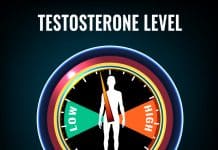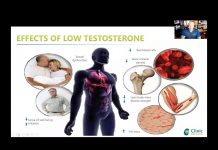VIDEO TRANSCRIPT:
The causes of hypogonadism could be chronic liver disease, COPD, sleep apnea, renal disease, use of different drugs, like I said before: glucocorticoids, opiates, ketoconazole, which is an antifungal. Anabolic steroids can actually shut down testosterone production. HIV, hypertension, lipids, infertility, obesity, sleep apnea, arthritis, diabetes, and other conditions. I’ll explain later what that means. Genetic mutations, and there are some genetic mutations that can affect sexual development in boys. As I said before, environmental factors: metabolic syndrome, illnesses, aging, other hormone deficiencies. Thyroid is one of them, very connected to testosterone production. Nutrient deficiencies, as I said before, lifestyle issues, medications.
This is actually a slide that I got from SpectraCell, a very good company in Houston that tests micronutrient levels in lymphocytes, not in actual blood, but in lymphocytes which is supposed to be more precise. This graph doesn’t say that adding these vitamins actually improves testosterone blood levels. They may do so, only if you have a deficiency. Zinc, definitely good data. Magnesium, vitamin E, vitamin K, vitamin D, vitamin B6, and folate. If you do supplement, and you have no deficiencies, you will not see improvements in testosterone. That’s as simple as that.
The benefits of testosterone therapy. This is probably now evidenced from all the other slides that I’ve covered: improved continuity of function, mood, libido, stamina, believe it or not, improved cardiovascular health. Actually, men with lots of testosterone tend to die of heart disease faster than men with normal testosterone. There’s obviously controversial data right now that has been discussed a lot in the past three years on the use of higher doses and poorly managed testosterone therapy that has been associated with increased cardiovascular risk. Improvements in body composition, glucose control, fertility. When you improve testosterone, you can improve fertility to a certain point, and then you may have a decreased infertility depending on different factors. Exercise, functional capacity improves, and there’s some studies, not too many, very small data set, that may suggest that improved longevity and survival.
How long does it take to see benefits? That’s another one of those questions that we get a lot on Excel Male. Obviously, it’s hard to predict. Everybody’s different, depends your age, depends on morbidities, if you have diabetes, if you have high blood pressure, if you’re 29 compared to a 65-year-old. Obviously, there are different conditions and different factors that are involved in the efficacy of testosterone. You see here the different colors. The blue lines say maximum benefits are reached, and on the bottom you see weeks. The darker green is upper, and the lighter green is lower duration when benefits are reached.
Inflammation decreases. Testosterone replacement decreases inflammation very fast, within three to 12 weeks. Blood sugar control, anywhere from 12 weeks on the lower side to 52 weeks. Bone mineral density takes a long time because obviously bone is a lot harder to build. It’s a very slow process. Body composition up to 52 weeks. Depressive mood could be anywhere from as fast as three weeks to as low as 30 weeks. Quality of life could be also you can see benefits within a few weeks. That’s usually what happens. The men tend to feel really well, really good, the first month. Then it tends to plateau, and they get very discouraged after a while, but in most men, like me, therapy [inaudible 00:05:18] forever. We wake up to the fact that it’s actually improving our quality of life. If we ever run out of testosterone or we stop for any reason, out of our control, that’s when really we’re awakened to the fact that our quality of life, we have reached a new normal that we forget about.
Erections and ejaculations, that is difficult to assess. Some men do experience better erections, especially morning time erections, and some men don’t. It also depends on age and different factors, that we really don’t know all the factors involved. Sexual interest is probably the factor that improves the fastest and the most obvious, within three to six weeks. There’s more interest in sex or more attraction to potential sexual partners. There’s more interest in general to approach or proceed to have sex or masturbate. That’s one of the first in terms that if it’s not improved, there’s definitely something going on that your doctor needs to look at.
More information: https://www.testosteronewisdom.com/4196/testosterone-replacement-therapy-latest-research/














